Tooth pain is one of the most common and dreaded dental issues, yet it is often surrounded by myths and misconceptions. These myths can prevent people from seeking the right care, worsen existing problems, or lead to unnecessary anxiety. Understanding the truth about tooth pain is essential for maintaining good oral health and addressing any discomfort effectively. In this blog, we’ll debunk some of the most common myths about tooth pain and provide the facts you need to make informed decisions.
Myth 1: If the pain goes away, the problem is solved.
Fact:
The temporary disappearance of tooth pain doesn’t mean the underlying issue has been resolved. For instance, if a cavity reaches the tooth’s nerve and causes infection, the pain might stop as the nerve dies. However, the infection can still spread, leading to more severe problems like abscesses or bone loss.
Ignoring tooth pain, even if it subsides, can result in serious dental and health complications. Always consult a dentist to identify the root cause and address it appropriately.
Dental Implants vs. Dentures: Which Solution is Best for You?
Myth 2: All tooth pain means a cavity.
Fact:
While cavities are a common cause of tooth pain, they are not the only reason. Tooth sensitivity, gum disease, cracked teeth, abscesses, and even sinus infections can cause discomfort. Identifying the specific cause requires a professional evaluation, as different conditions require different treatments.
If you’re experiencing persistent or severe tooth pain, don’t assume it’s just a cavity—visit your dentist to determine the real issue.
Myth 3: If there’s no visible damage, the tooth is fine.
Fact:
Tooth pain doesn’t always come with visible damage. Issues like deep cavities, cracked tooth syndrome, or infections inside the tooth may not be apparent to the naked eye. Additionally, pain originating from the gums or jaw may feel like it’s coming from the tooth.
Dentists use X-rays and thorough examinations to detect hidden problems that may not be visible or obvious to you.

Myth 4: Tooth pain is always caused by poor oral hygiene.
Fact:
While poor oral hygiene is a significant contributor to many dental issues, it’s not the only factor. Even individuals with excellent oral care routines can experience tooth pain due to factors like genetics, bruxism (teeth grinding), trauma, or infections.
Regular dental checkups are crucial, regardless of how diligent you are with brushing and flossing, to catch and prevent issues before they cause pain.
The Ultimate Guide to Choosing the Right Dental Clinic for Your Oral Health Needs
Myth 5: Cold or hot foods always cause tooth pain because of sensitivity.
Fact:
Sensitivity to hot or cold foods is often a sign of an underlying issue, such as worn enamel, gum recession, or tooth decay. However, not all sensitivity is caused by enamel problems. Sometimes, it can be linked to deeper dental issues like exposed tooth roots or cracked teeth.
If you notice consistent sensitivity, consult your dentist to determine the cause and explore treatment options like desensitizing toothpaste or dental procedures.
Myth 6: Tooth pain will improve with over-the-counter remedies.
Fact:
While over-the-counter pain relievers can provide temporary relief, they do not address the root cause of tooth pain. Relying on home remedies or medications without consulting a dentist can worsen the condition over time, leading to more invasive treatments.
For example, rinsing with warm salt water might ease mild discomfort but won’t fix a cracked tooth or clear an infection. Always seek professional help for persistent pain.
Myth 7: It’s normal for teeth to hurt as you age.
Fact:
Tooth pain is not an inevitable part of aging. Healthy teeth and gums should not cause pain, no matter your age. If you experience discomfort, it’s likely due to an underlying issue such as decay, gum disease, or worn dental work.
Proper oral care and regular dental visits can help prevent pain and maintain your oral health throughout your life.
Myth 8: Baby teeth don’t cause serious pain.
Fact:
Baby teeth, or primary teeth, can cause significant discomfort for children. Cavities, infections, or trauma to baby teeth can be just as painful as issues in permanent teeth. Neglecting dental care for baby teeth can also affect the alignment and health of adult teeth.
Parents should address any signs of pain or discomfort in their children’s teeth promptly with a pediatric dentist.
Myth 9: Root canals are always painful.
Fact:
Root canals have a reputation for being excruciating, but this is a misconception. Modern dentistry has made root canal procedures virtually painless, thanks to advancements in anesthesia and techniques. In fact, the procedure relieves the pain caused by an infected tooth.
Fear of pain should never deter you from seeking treatment. A root canal is often the best way to save a damaged tooth and eliminate pain.
Myth 10: Tooth pain is harmless and doesn’t affect overall health.
Fact:
Tooth pain can be a sign of infections that, if left untreated, may spread to other parts of the body. Dental abscesses, for example, can lead to life-threatening conditions such as sepsis if not promptly addressed.
Additionally, chronic oral health problems have been linked to heart disease, diabetes, and respiratory infections. Prioritizing your oral health is an essential part of maintaining overall well-being.
What Should You Do If You Have Tooth Pain?
If you’re experiencing tooth pain, don’t ignore it or rely solely on home remedies. Follow these steps:
- Schedule a Dental Appointment: Contact your dentist as soon as possible to identify the cause of your pain.
- Avoid Triggers: Until you see your dentist, avoid foods or drinks that exacerbate the pain, such as hot, cold, or sugary items.
- Manage Discomfort: Use over-the-counter pain relievers or a cold compress to alleviate swelling and discomfort temporarily.
- Maintain Oral Hygiene: Continue brushing and flossing gently, but avoid the painful area if it’s too sensitive.
Tooth pain is a symptom that should never be ignored or underestimated. By understanding the facts behind common myths, you can take proactive steps to protect your oral health and address issues early. Remember, your dentist is your best ally when it comes to diagnosing and treating dental problems, so don’t let fear or misconceptions prevent you from seeking the care you need.
By separating fact from fiction, you can maintain a healthy, pain-free smile and enjoy the confidence that comes with it.




